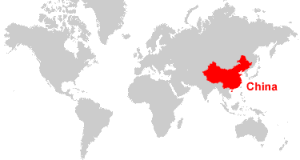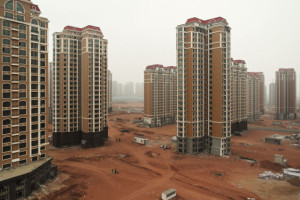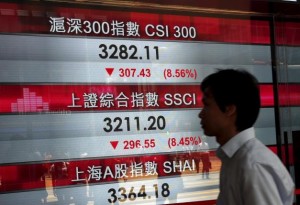 In real economic terms, and as the second-largest economic power in the world since 2005, China has been a global player for a few decades.
In real economic terms, and as the second-largest economic power in the world since 2005, China has been a global player for a few decades.
In global financial market terms, however, China became interesting to the rest of the world for the first time this Summer.
I use the word ‘interesting’ the way it’s meant in the disguised curse ‘may you live in interesting times.’’[1] Interesting financial problems in China became the world’s problems for the first time recently, as we witnessed the first global financial market-swoon attributed to trouble in Chinese financial markets.
Economy v. financial markets
China right now represents a case study in the difference between an ‘economy’ and ‘financial markets.’
We kind of already know that these two things – ‘economy’ and ‘financial markets’ – are distinct, but linked. Also, they interact.
The 2008 Crash in the United States was an example of trouble in the financial markets crashing the real economy, as excessive losses from sub-prime structured mortgages, followed by further excessive losses from illiquid structured products among financial firms, eventually caused construction halts, unemployment, and foreclosures – in other words, real-economy misery.
Causation just as typically runs the other way, in which a decline in real-economy profits leads to a slow-down in financial volumes and asset prices.
A real economy and its financial markets each influence the other, but can – for a time at least – differ drastically.
The distinction between the real economy and financial markets matters when viewing China’s struggle this year, especially in light of financial market fragility.
The real Chinese economy
I think we in the US forget to acknowledge – or in our narrow-minded patriotic competitiveness we prefer to overlook – the economic miracle of China.
For my part, I think the wealth gains for hundreds of millions of Chinese represents the greatest miracle for humanity over the last 50 years.
Among urban Chinese, only 10 percent could be considered middle class or above as recently as 2002. Just ten years later, 70 percent of urban Chinese achieved middle class or higher economic prosperity.
No society has ever developed that fast, on such a vast scale.
I can’t think of any social change as profound as the lifting of 500 million Chinese from poverty into relative middle-class prosperity in a single generation.
Whatever you think of the Chinese system (Is it Communist? Is it Capitalist? Is it a Socialist Market Economy with Chinese Characteristics? Who cares?) The economic miracle is real and amazing and to be celebrated.
Let’s not forget that gains in the real economy of China are real, impressive, and irreversible.
The Chinese financial system
And then there’s the Chinese financial system. Between lending, stock-investing and the currency, I mistrust all of it.
On the banking and lending side, to a degree we would find ludicrous in the US, Chinese lending institutions act with governmental direction. Back in my emerging market Wall Street bond days, a pattern developed with Chinese government-sponsored lending. State-supported investment banks in many provinces, known as ITICs, would periodically go bankrupt as a result of politically-directed lending.

Meanwhile private business and consumers – borrowers not connected to the government – traditionally find it difficult to access any bank credit at all
On the stock-investing side in China, this year has been a roller-coaster ride for the ages. Throughout the Spring, stocks blasted ever-upward, with numerous stocks and especially new issues hitting their daily ‘limit up,’ meaning trading halted once the price rose too much in one day. Come Summer, however, that process reversed, with numerous stocks and exchanges hitting their daily ‘limit down’ as stocks went into freefall.
Now, there’s nothing inherently wrong with volatile stock markets, except maybe various group’s reactions to the volatility.
The Chinese government, apparently seeing stock market instability as an existential threat, intervened numerous times since the market’s June 12 peak.
Some of these interventions include:
- Loosening up and providing additional funding for margin-lending accounts for retail investors July 2nd and July 9th (scary!)
- Dropping interest rates June 27th and August 25th (ok!),
- Adjusting downward the currency – the greatest change in two decades – on August 11th (dramatic, but ok!),
- Direct government purchasing of large-company stocks (hey, go for it!)

You can’t accuse the Chinese government of being inactive in the face of the stock-market crash. Probably that’s wise, because…
Chinese household investors, to the extent the financial press is accurate, appear to be counting on the power of the central government to prevent a market collapse.
This idea of the central government’s capacity to bail everyone out gets referred to in China as the ‘National Team,’ as in an investor saying: “I don’t worry about the Chinese stock market going down too much because we have the “National Team” on our side.
You can probably see how that line of thinking – if enough people follow it – will end in tears someday for the individual investor, or the central government, or both.
The roughly 40 percent – or estimated $5 Trillion in market value – drop in the Shanghai Composite Index since June 2015 naturally has all sides extremely anxious.
As I mentioned in the beginning, the most interesting thing for a US-based person, is the extent to which this all matters, for the first time, to global markets.
Before this past Summer, China’s financial sneezes had never caused the world financial markets to catch a cold. Now that’s happened for the first time and there’s no going back.
[1] Interestingly, I just learned from a simple Snopes.com search this curse isn’t Chinese at all, but probably dates to a letter by an American named Frederic R. Coudert written around 1936. Coudert attributed the phrase to British politician Austen Chamberlain (brother of the infamous Prime Minister Neville “Peace in our time” Chamberlain.) Robert Kennedy popularized it during a speech in 1966.
A version of this post ran in the San Antonio Express News
Post read (774) times.
